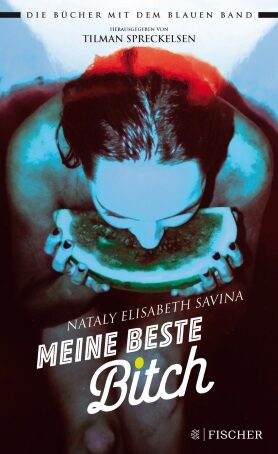Nataly Elisabeth Savina
Meine beste Bitch
[My Best Bitch]
- Fischer KJB
- Frankfurt am Main 2018
- ISBN 978-3-737-34139-4
- 281 Pages
- 13 Suitable for age 14 and above
- Publisher’s contact details
Sample translations
Longing, joie de vivre, grief and humor
“I don't need a happy ending, I just want to read about a main character that I enjoy following and understand,” Nataly Elisabeth Savina said in an interview about her first novel “Love Alice”. As in her second novel, “Herbstattacke”, the young author with Latvian roots, portrays a phase of youth that is hanging in the balance between liberation and nightmare, and which revolves around the major experiences of life and the twin pursuits of happiness and identity. These experiences are portrayed with the kind of intensity that we know mostly from young people.
Also, in „Meine beste Bitch” - a bitch is a brat or a slut – the author gives us the entire gamut of emotions. “Normality is not a state, but an assertion,” says Faina's mother, who works as a psychiatrist in a clinic. And in this novel, almost nobody is “normal”. Not the seventeen-year-old narrator, Faina, who suffers from panic attacks, itching and nightmares. Not her mother, who constantly interferes in Faina's life in a way that seems filled with envy and borders on being abusive. Nor is Faina's dearest friend Nike, who gets involved in every possible social and political project that crosses her path, and which at some point leads her to steal Faina’s beautiful, opaque boyfriend Julian.
Even Berlin, the big city of dreams, is not “normal”, rather is described as, “fluttering, cherry juice flirty and funky glittering,” as well as its converse: bleak, filthy and lonely. There, where everything is possible, Faina spends a crazy summer with Julian, where the two celebrate their new freedom with sex, alcohol and kinky art performances. They want to study art and deal on a practical and theoretical level with the question of how innovative, independent, or original art can still be today. Questions that are not answered in this novel, but with this novel.
Indeeed, if “Meine beste Bitch” is anything, it's creative! And it is so in many ways: not only are the eccentric cast of characters and densely atmospheric city of Berlin unusual, Savina’s narrative style is also idiosyncratic and charming. With intuitive certainty, she masters the most diverse tones. Faina analyzes her mental and physical defects in a language that is clear and incisive, her life and experiences are described in a cool and concentrated style. Then - as if enlightened - she describes her feelings and moods with intensively poetic imagery, sensual and dense, or she makes witty-ironic comparisons as a way to describe complicated states of mind. Her ability to express herself is as rich and multilayered as her psyche, and it is not only gripping, but also touching to observe how distance and closeness, freedom and inner conflict directly express themselves through the medium of language.
The literary and musical quotations peppered throughout Nataly Elisabeth Savina’s text perfectly suit the Berlin scene. Whether Leonhard Cohen, David Bowie, Atomic Swing or Albert Camus - they are Faina's reference points and her companions throughout the painful and euphoric process of growing up. „Meine beste Bitch” describes a very special phase in life that takes place everywhere in the Western world, if not in the same way, then under similar auspices. The intoxication of freedom and the trance of first love: of leaving and letting go, of betrayal and loss, of new beginnings. Without a happy ending, without sentimentality, breathless, confusingly beautiful, much as the author also describes the Sean Lennon song “Wait for me”: as a “mixture of longing, joie de vivre, grief and humor.”
Translated by Zaia Alexander

By Sylvia Schwab
Sylvia Schwab is a radio journalist with a special interest in literature for children and teenagers. She serves on the jury for the monthly ‘Best 7’ list of books for young readers produced under the aegis of Deutschlandfunk and Focus, and works for Hessischer Rundfunk, Deutschlandfunk and Deutschlandradio-Kultur.
Publisher's Summary
"Sometimes people manage to attract you like a black hole."
Faina has graduated from high school. Finally she has escaped the stuffy small town where she grew up, escaped from her analytical mother, a psychiatrist, who seems to see through everything. Finally she’s off to Berlin, where everything is so fluttery, cherry juice flirty and funky glittering. The art academy she has been accepted to study at can wait. Faina throws herself into the big city: freedom, nightlife, culture and unrestrained love. Because there's Julian. The aspiring performance artist, who is so thrillingly different, with whom everything is so intense. Faina has fallen heads over heals for him as if in a trance. And then the shock: Julian falls in love with her best friend Nike and betrays their connection. Furious with rage and disappointment, Faina trashes Julian's apartment and wipes the two most important people out of her life. But then an accident happens, which casts their relationship in a new light.
Nataly Savina has succeeded in writing an extraordinary, powerful, modern novel of development, which accompanies a young woman as she searches for her real self. Distinctive, moving, stirring, genuine.
(Text: Fischer KJB)
